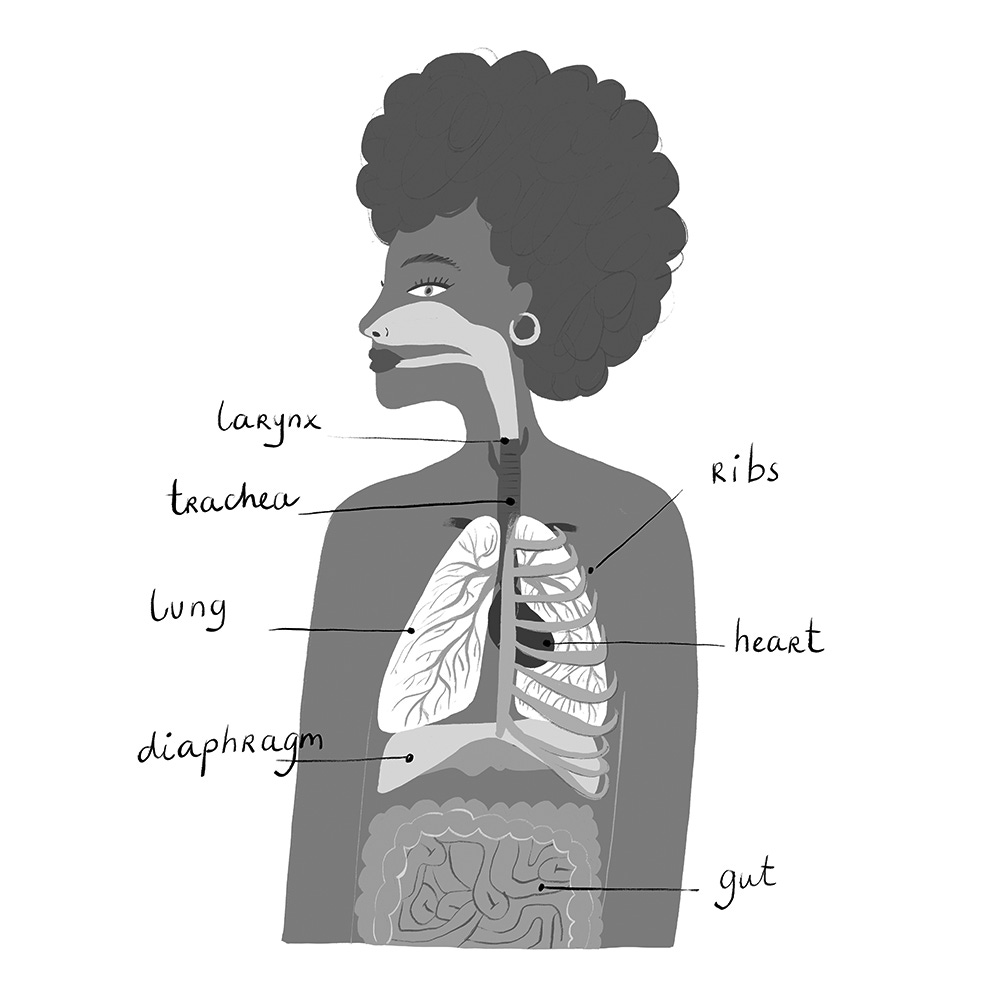Why not use your outside voice? You know I sometimes think the most effective people in the world are introverts who taught themselves to be extroverts.
Meg Wolitzer, The Female Persuasion (2018)
Confident, expressive voices benefit from some boldness in the delivery. This is where it helps enormously to understand how to project your voice. Then you can own your words with ease.
What you need to understand is the difference between your inside voice and outside voice. Inside voice is quiet, intimate, one to one. Outside voice has a relaxed, open resonance that easily fills a room.
The voice that will allow you to be heard is an outside voice that has an easy, centred power. It’s the voice that calls ‘Hi!’ with delight across a garden to an old friend. The voice that can easily fill a room, welcoming people to an event. It’s a voice that feels as if it’s hugging you with energy. Some people don’t use their outside voice in their spotlight moments because they don’t want to be seen as too big, too pushy.
I understand that it can feel difficult. Cutting into a room full of loud voices can be daunting, even when you know you have something worth saying. You can’t get a word in edge ways because they’re all so loud. Or you try to cut into the conversation and a mouse squeak emerges out of you, so people talk over you, or pick up your idea and run with it and get all the credit. It can be so disheartening that you then sit back in a secret vow of silence. But sitting out of the conversation can be equally frustrating, especially if it takes a turn you don’t agree with.
If we all lived in wide, open spaces, we would mostly have the ability to have wide, open voices. Our bodies, our voices, have an inherited muscle memory of calling across large spaces. We didn’t evolve in offices, cars and lifts. Just the act of imagining that you are in a wide, open space, looking out on a vast horizon, with soft grass under your feet, can have a huge impact on your voice and body language: your voice will be open, relaxed and have an easy projection.
After a day in a small meeting room, or a silent, open- plan office, you will notice the opposite: a little voice that struggles to fill space. It is important to understand that these are habits.
You can change the habit of speaking only in inside voice and learn to find your outside voice when you need to speak up for some thing you care about, or connect with a larger group of people.
To be heard, you must commit. Think about driving. If you are too tentative, no one will make way for you. If you nose out into the traffic confidently and respectfully, people will make way.
When you are bold and committed people make space for you because you have already made space for yourself.
If you want to share your voice fully with an audience you need to find your support muscles, which give you your inner volume control. They support the column of air going out of your body which creates volume. They are the same postural muscles low down, and these exercises teach you how to use them effectively. To find the postural muscles a really simple thing to do is squeeze the palms of your hands together at diaphragm height. Or you can do a yoga prayer position, or press one palm on top of the other. Can you feel the muscles low down in your torso as you squeeze? If you talk now you will feel these muscles support your sound from low down too. These are the deep support muscles that give your voice power.
● ● A simple way to reconnect to these muscles that sup port your volume is to do a controlled ‘ssssssss’ sound, squeezing the sound out of you, like toothpaste from a tube, from the bottom first, then core and stomach, then ribs.
● ● If you prefer, you can also test this with a straw and a glass of water. Blow air through the straw into the water to make bubbles and hum as you do this. Can you feel the muscles around your stomach, ribs and the inner muscle of the diaphragm supporting the lungs squeeze the air out? Those muscles will give you pro jection power. Notice that if you squeeze the lower support muscles harder you have more bubbles (just like blowing up a balloon). This is volume – air pressure is volume.
● ● Now use these muscles to give you effortless power. Open up your arms wide and with a lovely open yawn feeling in the throat send out a big expansive ‘Heyyyyy’ as if you are greeting a friend in another room in your house or across a field. Keep your mouth open and smiling and notice how you are able to extend the sound easily. The aim is that the throat stays open, you are relaxed and smiling, and the work happens low down.
Will you try these? Let me know how you get on!
Caroline x


